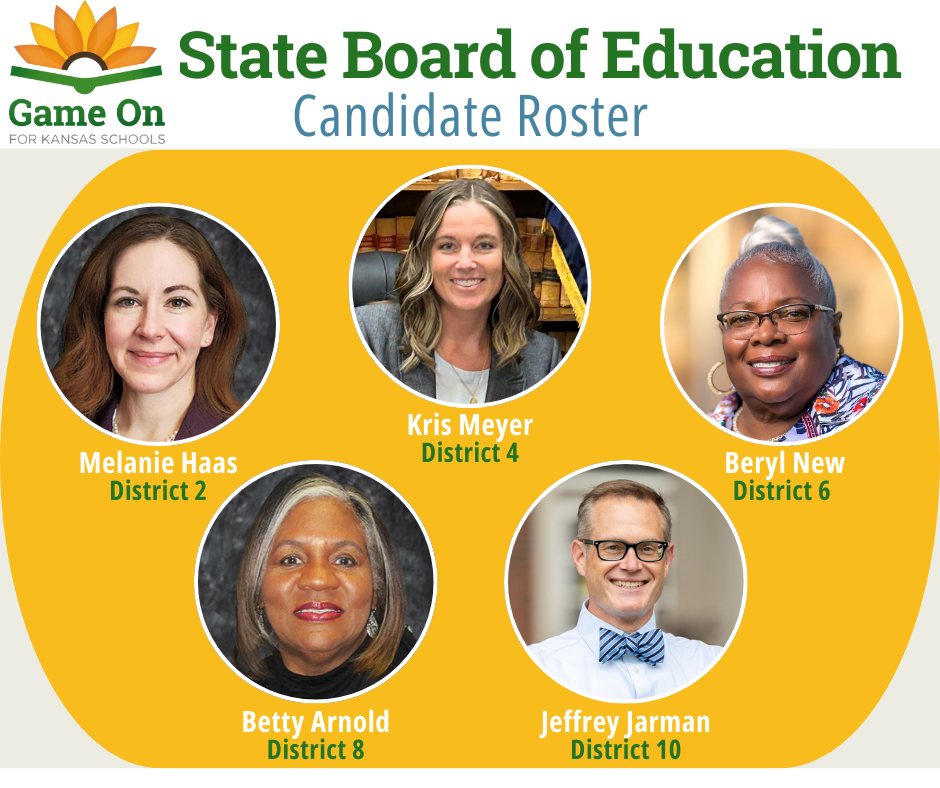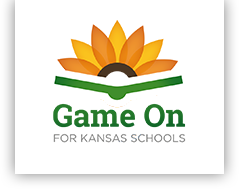The following is a deeper dive into the tremendous risk we face of losing our State Board of Education to extremists, adapted from a piece by former Lawrence BOE member Marcel Harmon.
Where Things Currently Stand
After the 2022 elections we were left with six traditional State Board of Education members, and four extremists embracing various policy positions of anti-public education activists. These included Danny Zeck in District 1, Michelle Dombrosky in District 4, Cathy Hopkins in District 5, and Dennis Hershberger in District 7, the latter two defeating more centrist opponents in the primaries.
During their candidacies they all leaned into parental control over school curricula (code for some parents’ extremist, Christian nationalistic, anti-public education control), and “opting-in” for social-emotional learning (as some extremists have started tying this to Moms for Liberty-type criticisms of critical race theory). Note that the Kansas State Department of Education (KSDE) currently lists social-emotional growth, which teaches students “self-awareness, social awareness, problem solving, and decision making” skills, as one of its priorities. During their campaigns, Zeck railed against “Washington Liberal Standards” while Hershberger utilized the slogan, “faith, freedom, and families.” In an iVoterGuide online survey filled out at the time for the primaries, these candidates all stated that teachers who are licensed should be allowed to carry guns at school. As KCUR noted, this “site is a division of the American Family Association Action, whose parent group is designated as a hate group by the Southern Poverty Law Center” (SLPC).
Since the 2022 elections, these individuals have negatively impacted the functioning of the board. During one meeting, Zeck railed against books with “smut” in school libraries, cursing, and raising concerns about “Marxist Lesbianism.” During this same meeting Hershberger lamented about the “pornography” he claimed some students are exposed to and Dombrosky makes some points about parental rights and authority during the discussion implying that districts were discouraging parents from exercising these rights. Anti-LGBTQ sentiments, destructive accusations that districts actively hide aspects of curriculum from parents, and the desire to mandate book bans from the state level, were expressed in this meeting. (Game On did a post on this meeting-link in comments below.)
These are all attacks on Kansas public education as an institution, framing districts as actively avoiding transparency and educators as incapable or unwilling to do their jobs. Jim Porter, representing District 9, recognized this and pointed out that the discussion could be interpreted as indicting library media specialists, teachers, and others for deliberately providing inappropriate material to students. He called this an unfair characterization of individuals he believes are conscientious, want what’s best for all Kansas students, and are working hard to ensure that’s the case.
And we know these attacks add stress to teachers, library media specialists, administrators and other staff. It contributes to their leaving specific districts, states, and education as a career overall, while also making it more difficult to recruit into the profession. Such language and out-of-context condemning of books is also part of the growing book banning efforts we’re seeing in Kansas as well as nationally. A lot of these efforts target aspects of teaching the U.S. history of racism and genocide, and inclusiveness.
Book banning, limiting the sharing of ideas and our ability to understand the world around us in all of its wonderous diversity, is aberrant to education, especially public education. It limits the possibilities for any individual student, and as a nation it makes us weaker on the international stage. It’s also a favorite tactic of white Christian nationalist movements, authoritarians, or any group wanting to limit the sharing of ideas and information to help maintain power. Banning books and reshaping American libraries (including school libraries) is also a key component of Project 2025.
Just as insidious are the abstentions made by these board members on key votes. Among them include votes on a) the allocation of federal COVID-19 relief funds to local school districts, b) amendments to teacher licensure requirements, c) high school graduation standards, d) a program allowing high school students to earn college credit, and e) McKinney-Vento funding to aid homeless students. The current rules require at least six votes among the 10 members to take formal action on a motion or resolution. Therefore, such seemingly weaponized abstentions risk preventing the board from doing its work if any other member ends up needing to abstain due to a conflict of interest or if one of the more centrist members happens to be aligned with these four on a given issue.
By abstaining, these members are also on the record as neither opposing nor supporting specific policies through their votes, limiting the use of their record against them in future elections. It decreases the transparency of their actions, and more importantly their underlying motives and goals. And while four abstentions aren’t normally enough to cause a vote to fail, in one instance last year, one of the traditional board members was absent and the abstention caused the approval of necessary funding to fail. Thankfully constituents of one of the four members convinced her to change her vote. This is not serving their constituents or the students of the state. It’s refusing to do what they’ve been elected to do and actively undermining the SBOE to harm the state’s public education system and achieve their extremist ideological goals. As Mark Ferguson, legal counsel to the State Board of Education put it,
My conclusion is an abstention is not really the appropriate vote for a board member who is simply in opposition to a position or a board action. I would go out a little further and say that an abstention — a nonvote — is an abdication of the responsibility to vote or to take a position on a particular issue. Ferguson at the time also recommended the board clarify its policy to record abstentions as a “no” vote, and the board now prohibits abstentions.
While abstentions are no longer permitted, “no” votes are. If we get one more extremist on the board, we could see deadlock on the board as most matters take 6 votes in favor to pass. If we get two more, the extremists will be in the majority. That will mean that the percentage of the SBOE’s (and KSDE’s) time and resources spent on culture war issues will continue to increase, undermining the functioning of the board and KSDE.
November 2024 Elections – Traditional candidates we support
• District 2: Melanie Haas (currently SBOE Chair)
• District 4: Kris Meyer
• District 6: Beryl New
• District 8: Betty Arnold (currently on the SBOE)
• District 10: Jeffrey Jarman
November 2024 Elections – Extremist candidates
• District 2: Fred Postlewait
• District 4: Connie O’Brien
• District 6: Bruce Schultz
• District 8: Jason Carmichael
• District 10: Debby Potter
O’Brien, Carmichael and Potter provided responses to the iVoterGuide online survey (though Carmichael’s was for a previous Wichita BOE candidacy). Their responses fall right in line with those of the four existing problematic board members discussed above. All three support vouchers, eliminating the U.S. Department of Education, displaying the Ten Commandments within schools, and arming teachers.
O’Brien’s campaign website is an expression of extremist talking points that inaccurately portray public education. She also laments “indoctirnation” [sic]. (See Game On post in comments.)
Potter brings a heavy focus on home schooling, having previously founded the Wichita Falls Home School Co-op. According to her website, she’s “a proven advocate for parental empowerment [code for taking away the control of curriculum from teachers and districts] and school choice” [code for using public funds for private schools without the same level of oversight]. Among what she shares on her Q&A page includes her beliefs that a) federal dollars shouldn’t come with strings attached, b) “… local schools have had to water down their standards that reflected the values of their community to accommodate an ever growing vocal minority,” c) public education doesn’t need any more funding, and d) special education in particular has been fully funded, referencing the Kansas Policy Institute (KPI) for her information. She also references KPI’s Kansas School Board Resource center as a great resources for better understanding the role of local school boards in Kansas education. We strongly disagree with that characterization as KPI has opposed public education advocates on nearly every education funding and policy bill we have seen over the past decade. (See Game On post in comments.)
Schultz is a classic stealth candidate, avoiding public statements on his views, and failing to mention that he has apparently exclusively interacted with Lutheran and homeschools, including for his own children. He parrots the extremist talking points about needing to focus on academics implying our schools and teachers aren’t already doing that. He has also refused to say his position on vouchers even in a forum where he was directly asked that question.
There isn’t much available on Postlewait. At one point he told the KC Voter Guide that he was “too busy” to talk. But the following two statements are from his campaign website:
Over the past decade social engineering has replaced education. The train is off the tracks. We need to return to teaching science, mathematics and English Language Arts. Let’s not forget about educating students to US History and US Government – Civics.
Mission Statement: Education First (Math, Science, ELA), Parental Involvement, Programs for students falling behind, Better ACT Scores, Reduce Classroom Distraction, Safety, Spend Money Wisely, Hold the line on Taxes
These are typical conservative, anti-public education talking points that include bashing the current state of public education, though watered-down somewhat to make them seem a bit less controversial on the surface.
It doesn’t appear that the two Kansas Chapters of the far right group Mom’s for Liberty – Johnson County and Ford County – have made any SBOE endorsements at this point. But there’s certainly alignment between these candidates and what Moms for Liberty endorsed candidates agree to support. Scrolling through both chapters’ Facebook pages finds a plethora of posts aligned with everything above that I covered about these candidates. And Carmichael’s ballotpedia page indicates he’s signed their pledge (though he isn’t currently listed). And just to be clear, the Southern Poverty Law Center (SLPC) classifies Moms for Liberty as an extremist antigovernment group. They state:
Moms for Liberty and its nationwide chapters combat what they consider the “woke indoctrination” of children by advocating for book bans in school libraries and endorsing candidates for public office that align with the group’s views. They also use their multiple social media platforms to target teachers and school officials, advocate for the abolition of the Department of Education, advance a conspiracy propaganda, and spread hateful imagery and rhetoric against the LGBTQ community.
In short, none of these extremist candidates should be serving on the State Board of Education. This is the body that sets curriculum standards and graduation requirements for schools and exercise the SBOE’s constitutional powers to guide public education and local districts statewide. The following is its mission statement:
The mission of the State Board of Education is to prepare Kansas students for lifelong success through rigorous, quality academic instruction, career training and character development according to each student’s gifts and talents.
Board members who disrupt SBOE meetings, derail SBOE and KSDE operations, focus on culture war issues, disparage and undermine district teachers, staff, and administrators as a whole, or align oneself with anti-public education organizations and legislators who want to defund public education don’t end up providing rigorous, quality academic instruction, career training and character development. These candidates don’t even agree we should be using one of the state’s five key outcomes of measuring success: “Social/emotional growth measured locally.”
They want to “serve” on the SBOE not to support public education, but to harm it, and to undermine it. We ALL benefit from a strong public education system, and we all need to be informed voters.

Originally posted to Facebook 11/4/2024.
